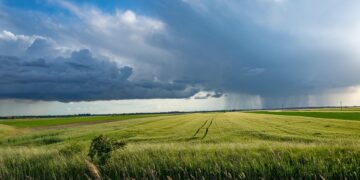Growing a Greener Tomorrow: The Future of Sustainable Agriculture
In recent years, the importance of sustainable agriculture has become increasingly evident. With a growing global population and the looming threat of climate change, it is essential that we find ways to produce food in a way that is both environmentally friendly and economically viable. Sustainable agriculture offers a solution to these challenges by focusing on practices that minimize negative environmental impacts, promote biodiversity, and support the long-term health of our planet.
The Benefits of Sustainable Agriculture
There are numerous benefits to adopting sustainable agriculture practices. One of the most significant advantages is the preservation of natural resources. By using techniques such as crop rotation, cover cropping, and integrated pest management, farmers can reduce their reliance on harmful chemicals and fertilizers that can degrade soil quality and pollute waterways. Additionally, sustainable agriculture can help to mitigate climate change by sequestering carbon in the soil and reducing greenhouse gas emissions.
Common Questions About Sustainable Agriculture
As more people become aware of the importance of sustainable agriculture, there are many questions that arise about how it works and what the benefits are. Here are some common questions and answers:
What is sustainable agriculture?
Sustainable agriculture is a way of farming that focuses on producing food in a way that is environmentally friendly, socially responsible, and economically viable. It involves practices that promote soil health, water conservation, and biodiversity, while also supporting the well-being of farmers and their communities.
How does sustainable agriculture differ from conventional agriculture?
Conventional agriculture relies heavily on synthetic chemicals and fertilizers to boost crop yields, often at the expense of the environment. Sustainable agriculture, on the other hand, emphasizes natural and organic methods of farming that prioritize soil health, water conservation, and biodiversity.
What are some examples of sustainable agriculture practices?
Some examples of sustainable agriculture practices include crop rotation, cover cropping, reduced tillage, integrated pest management, and agroforestry. These practices help to maintain soil health, reduce erosion, conserve water, and support biodiversity.
The Future of Sustainable Agriculture
As we look to the future, it is clear that sustainable agriculture will play an increasingly important role in feeding a growing global population while also protecting the environment. Advances in technology, such as precision agriculture and biotechnology, are helping to make sustainable farming practices more efficient and cost-effective. Additionally, consumer demand for organic and locally grown food is driving a shift towards more sustainable farming methods.
Challenges and Opportunities
While there are many opportunities for growth in sustainable agriculture, there are also challenges that must be addressed. One of the biggest obstacles is the resistance of some farmers to change their practices and adopt more sustainable methods. Additionally, there is a need for more research and education to help farmers transition to sustainable agriculture and overcome barriers such as lack of access to resources and markets.
Conclusion
As we face the challenges of feeding a growing global population while also protecting the environment, sustainable agriculture offers a promising solution. By adopting practices that promote soil health, conserve water, and support biodiversity, farmers can help to create a greener tomorrow for future generations. With advances in technology and a growing awareness of the importance of sustainable agriculture, the future looks bright for a more sustainable and resilient food system.
In conclusion, sustainable agriculture is not only essential for the health of our planet, but also for the well-being of farmers and consumers. By prioritizing practices that promote environmental sustainability, social responsibility, and economic viability, we can create a more resilient and equitable food system that benefits us all. The future of sustainable agriculture is bright, and by working together towards a greener tomorrow, we can ensure a more sustainable and prosperous future for generations to come.











